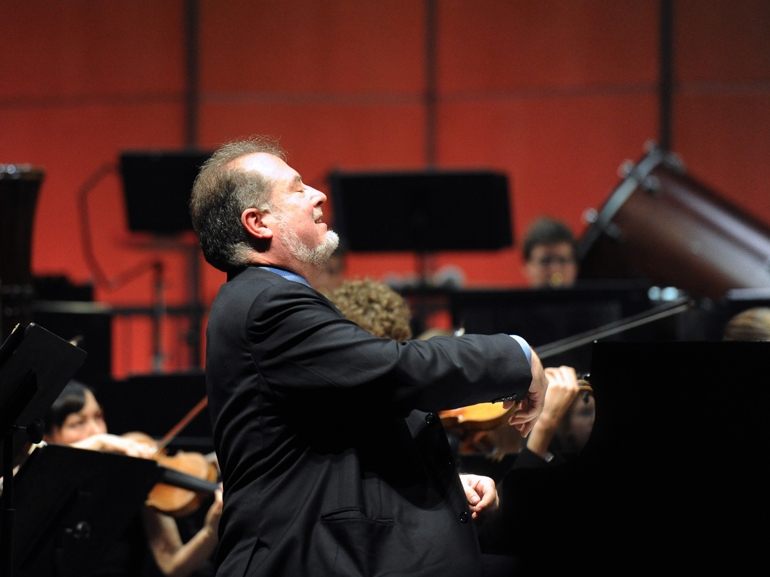
Toronto Summer Music Festival: Garrick Ohlsson (piano) at Koerner Hall, Thursday.
Garrick Ohlsson, the first and only American pianist to win the Gold medal in the International Chopin Competition, in 1970, and who has recorded Chopin’s complete piano music, is not performing anything by the great Polish composer this year. Instead, in recognition of the 100th anniversary of the death of Alexander Scriabin, he is showcasing the Russian composer at concert halls in London, San Francisco, Chicago and New York.
As part of the Toronto Summer Music Festival, Ohlsson, who was a student of Claudio Arrau, presented a program comprised of two Beethoven sonatas, opus 109 and 110 in the first half, and six Scriabin compositions in the second half.
In a lecture/recital on Beethoven’s piano sonata opus 109 number 30, Andras Schiff describes the final movement as “the most beautiful movement that Beethoven ever wrote.” Whether Garrick Ohlsson would designate the same movement as most beautiful is not possible to say, but judging from the tenderness of his performance of it at Koerner Hall on Thursday night, it is safe to conclude that he holds it extremely dear.
Schiff acknowledges that his judgment is highly subjective, and everyone is entitled to have his or her favorite movement. For many, it would be a difficult choice to make, but for me, of the two sonatas masterfully performed by Ohlsson, the most deeply affecting movement was the final one of Opus 110 in A flat major. (It’s possible that Anton Kuerti agrees, as he lists this sonata as one of the ten essential works for piano.
Beethoven’s composition of this sonata was interrupted by a life and death struggle with jaundice, and it seems as if he captured the entire experience of physical deterioration, helpless submission to an uncontrollable bodily process, gradual recovery and eventual relief and gratitude for restored health. While Ohlsson is one of the largest pianist’s on the concert stage today, at 6’ 4” and appears to be in robust health, he sensitively conveyed the fear of extreme illness experienced by Beethoven and expressed by the score.
In fact, Ohlsson appears to be in both good health and good spirits, especially evident in the relaxed and humorous way he spoke to the audience about the life and works of Alexander Scriabin in the second half of the program.
A composer who is acknowledged to be amongst the greatest yet not performed frequently, Scriabin’s work is especially apt for Ohlsson, by virtue of his mastery of Chopin, who Scriabin venerated to such a degree that he slept with his scores under his pillow.
Ohlsson’s description of Scriabin’s range of composition as unpredictable due to a rapid progression in styles culminating in “nearly destructive atonality” was useful for listening to the fascinating performance that followed. The formal program ended with Sonata No 5 in F sharp major Opus 53, complete with a dismount from the bench by Ohlsson that brought the Pan Am gymnast competitors to mind. The thrilled audience’s response, including ringing cries of “Bravo” was rewarded with three encores, including Scriabin’s Etude in C# minor composed when he was 15.
Toronto piano pedagogue Lawrence Pitchko, who played both the Beethoven sonatas on concert stages in Europe and North America in years gone by, turned to me after the first Beethoven Sonata and said “it doesn’t get any better than that”. Two other professional pianists I spoke with at intermission, each of whom independently praised Ohlsson’s clarity, echoed this enthusiasm. The appreciation of fellow pianists who have tackled and mastered the same scores means a great deal, and when the program includes Scriabin, it attracts highly accomplished and knowledgeable performers and listeners, which adds an extra frisson of excitement to the event.
The Toronto Summer Music Festival gets the credit for putting Ohlsson on their roster even though, according to the artistic director, Douglas McNabney, the pianist’s choice of Beethoven and Scriabin did not fall within the Festival’s Pan American inspired theme, The New World. But the program turned out to be in keeping with the theme in a different way.
As Ohlsson explained, Scriabin was a deeply spiritual mystic, who believed that humanity was on the edge of a transformation, heralded in part, by the beginning of World War One which he believed would result in a new, transcendent reality. He died in 1915 so did not live to see the grim outcome instead of the apocalypse he anticipated, but his vision of a new spiritual world can still be heard.
#LUDWIGVAN
Want more updates on Toronto-centric classical music news and review before anyone else finds out? Get our exclusive newsletter here and follow us on Facebook for all the latest.



